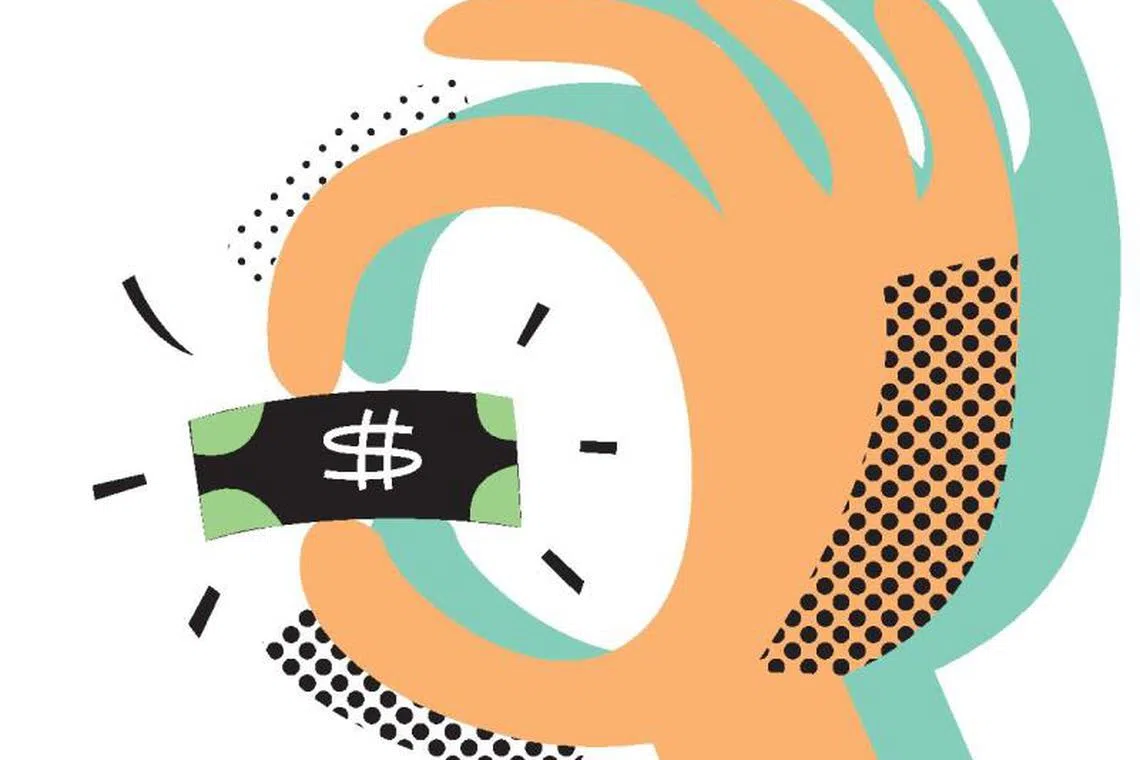Ghost jobs and AI girlfriends: A dystopian dictionary of modern financial anxiety
Sign up now: Get tips on how to grow your career and money

From “price walking” to AI girlfriends, new terms have emerged to describe the strange, sometimes bleak contours of modern economy.
ST ILLUSTRATION: CEL GULAPA
Follow topic:
SINGAPORE – A new lexicon has emerged to describe the strange, sometimes bleak contours of the modern economy, its terms of engagement and consequences. From “price walking” to AI girlfriends, here are some everyday dystopian terms to help make sense of today’s economy.
1. Ghost jobs
These are job listings created by companies with no intention to fill them – a common frustration experienced by online jobseekers.
“Ghost jobs” are not scams, but rather a manifestation of flaws in the recruitment ecosystem, The Wall Street Journal reported in January. Some companies want to give the impression that they are growing or may keep vacancies open on the off chance that a stellar candidate comes their way.
Such phantom vacancies are not uncommon. According to an analysis of internal data by global hiring platform Greenhouse, between 18 and 22 per cent of jobs advertised in 2024 were vacancies that were never eventually filled.
2. Quiet vacationing

Quiet vacationing refers to the practice of workers working remotely while travelling, without telling their bosses.
ST ILLUSTRATION: CEL GULAPA
This refers to the practice of employees working remotely while travelling, without telling their bosses or formally requesting leave.
Quiet vacationers
“Employees are working longer hours in an increasingly competitive job market, while also feeling the urge to fulfil pent-up travel desires post-pandemic,” says Dr Sriram Iyer, adjunct lecturer at the National University of Singapore (NUS) Business School. “This leads to a trend in which individuals combine work and leisure by taking vacations while still attending to work obligations.”
He also notes that the introduction of the Tripartite Guidelines on Flexible Work Arrangement Requests in April marks a growing recognition of the desire for flexible work that is fuelling the quiet vacationing trend.
3. Productivity theatre
These are actions workers take to appear busy without necessarily accomplishing meaningful work.
A 2023 global survey of more than 18,000 desk workers by workplace communication service Slack found that workers surveyed in India, Japan and Singapore reported spending over 30 per cent of their time on performative work, just to keep up appearances.

A 2023 survey found workers spending over 30 per cent of their time on performative work, just to keep up appearances.
ST ILLUSTRATION: CEL GULAPA
Respondents also indicated that 43 per cent of meetings could be eliminated without negative consequences. “This could have been an e-mail” is one common meme refrain to such theatre.
4. Asset limited, income constrained, employed (Alice)
This describes people earning above the poverty line, but who are still struggling to afford the essentials. The term was coined by American advocacy group United for Alice to refer to the growing number of Americans who make too much to qualify for social assistance, but not enough to avoid living pay cheque to pay cheque.
One closely related term is “precariat”, which refers to the growing class of workers with precarious employment such as gig workers, part-timers or contract staff, who lack stable benefits or job security.
As at 2023, it is estimated that 70,500 platform workers operate in Singapore, representing around 3 per cent of the workforce. The Platform Workers Act, passed in 2024, mandates Central Provident Fund contributions for platform workers and provides work injury protection.
Singapore does not have an official poverty line, but the 2023 Minimum Income Standard study
5. Ensh**tification
Coined by American tech critic Cory Doctorow, “ensh**tification”
This race to the bottom occurs because platforms initially operate at a loss to attract users, before the company’s focus shifts to extracting shareholder value. The quality then starts to deteriorate when users get locked in with few alternatives.
Frequently cited examples include the plight of vacation rental platform Airbnb, online dating apps, search engine Google, ride-hailing apps and social media platforms.
6. Dark patterns
“Dark patterns” are deceptive user interface designs that trick users into making choices they might not otherwise make.
Examples include subscription services that are easy to sign up for but tedious to cancel, pre-checked boxes opting you into marketing e-mails, or hidden additional fees and charges revealed only at the payment stage. Other ploys include creating a false sense of urgency or scarcity by implying that a deal might soon expire.
It was reported in 2024 that the Competition and Consumer Commission of Singapore has said such “dark patterns” on e-commerce websites will be an area of focus for the organisation’s new policy unit.
7. Price walking
Also known as the “loyalty penalty”, this price discrimination practice – sometimes found in insurance, telco plans and subscription services – sees long-time customers paying progressively more over time unless they cancel or renegotiate their plans.
Some jurisdictions, like the United Kingdom and parts of the United States, have moved to ban this practice for insurers.
In Singapore, where fierce price competition
8. Dynamic pricing
Another form of price discrimination. This refers to adjusting prices in real time based on demand and consumer data, most visibly on ride hailing apps’ surge pricing or travel booking platforms.
In practice, dynamic pricing means that what you pay may depend less on cost than what the system thinks you can pay.
In 2024, some Singapore netizens criticised children’s theme park
9. Shrinkflation

“Shrinkflation” refers to the practice of manufacturers reducing product size, while maintaining or increasing prices.
ST ILLUSTRATION: CEL GULAPA
“Shrinkflation” refers to the practice of manufacturers reducing product size, while maintaining or increasing prices, meaning less chips in a bag or smaller portions of cai fan.
A closely related but distinct concept is “skimpflation”, in which businesses cut back on the quality or availability of their services while keeping prices steady.
In March, Trade and Industry Minister Gan Kim Yong announced a pilot scheme for supermarkets
10. Buy now, pay later
Once reserved for big-ticket items like smartphones or furniture, interest-free instalment plans are now being offered for vacations, fast fashion and even food delivery orders through Grab PayLater and Atome. Grab now allows you to finance your McDonald’s delivery order over four interest-free payments.
While convenient for managing cash flow, the buy-now pay-later scheme has drawn controversy for having fewer safeguards than traditional credit and encouraging overspending – particularly among young adults. More than 70 per cent
In 2022, a code of conduct for providers of buy-now pay-later schemes in Singapore was formalised to guard against consumer overspending.

The buy-now pay-later scheme has drawn controversy for having fewer safeguards than traditional credit.
ST ILLUSTRATION: CEL GULAPA
11. AI companions
While many artificial intelligence (AI) fears revolve around job replacement, AI is fast gaining ground in an unexpected area: social connection.
A 2024 Stanford University study found that 63 per cent of over 1,000 students interviewed reported that AI assistants like ChatGPT helped to reduce their feelings of loneliness or anxiety.
Part of the appeal of AI systems is how they are cheaper than therapy or dates with other humans and are designed to be non-judgmental. Many also believe they are anonymous while speaking to one.
However, this agreeableness of AI is a double-edged sword, creating personal echo chambers as AI sycophantically agrees with whatever is proposed.
A small industry of AI start-ups has launched to capitalise on the desire for human-AI relationships
12. Data brokers
Data brokers are firms that collect and sell personal information. While many Singaporeans use digital platforms for “free”, this often involves terms and conditions which allow platforms to sell user data to brokers.
Such data is then used for targeted advertising, background checks and potentially by scammers and telemarketeers
The Personal Data Protection Act provides some safeguards, but many Singaporeans remain unaware of how extensively their digital footprints are bought and sold.
As one popular tech sector adage goes: “If you are not paying for it, you’re not the customer. You’re the product being sold.”
13. Brain rot
Oxford University Press’ word of the year in 2024
Dr Samer Elhajjar, a senior lecturer of marketing at NUS Business School, says that while humans may once have had more “boring” time to sit with their thoughts and reflect, this is no longer the case because of the “doomscrolling culture”
While the impact of this is not yet fully understood, some initial studies with children point to TikTok use being linked to anxiety and worse sleep and memory. While evidence on whether “brain rot” truly exists remains mixed, the term reflects growing anxiety with infinitely scrolling social media feeds and the attention economy.
14. Recession indicator
Real recession indicators are things such as inflation, investors flocking to gold, decreased home sales or companies freezing hiring.
For netizens, however, the recession indicator meme is used to reframe all kinds of everyday occurrences as ominous signs of a looming economic crash: the return of flash mobs, American pop singer Lady Gaga releasing a new album or someone not offering to split the bill on a date.
For instance, one might joke: “This article about cost-of-living hacks is a recession indicator.”
Analysts predict that Singapore is likely to avoid


